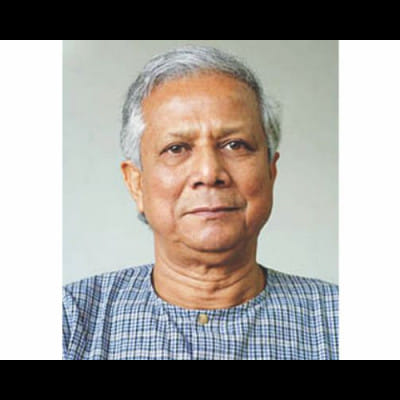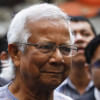Rohingya Crisis: Yunus seeks UNSC's quick intervention

Nobel Peace laureate Prof Muhammad Yunus yesterday called on the United Nations Security Council to immediately intervene to end the humanitarian crisis in Myanmar's Rakhine state.
In an open letter to the Security Council President and its members, the Bangladeshi economist said: "You are aware, the human tragedy and crimes against humanity has taken a dangerous turn in the Arakan region of Myanmar. It needs your immediate intervention."
He said, according to different organisations, recent military offensive by the Myanmar army in Rakhine state had led to the killing of hundreds of Rohingya people.
"Hundreds of thousands of people have been displaced. Villages have been burned, women raped, many civilians arbitrarily arrested, and children killed."
"Crucially, humanitarian aid organisations have been almost completely denied access, creating an appalling humanitarian crisis in an area already extremely poor."
According to local administration sources, around 120,000 people have fled to Bangladesh in the last twelve days, said Prof Yunus.
"Human misery created by such massive displacement of men, women and children under the threat of death is getting worse every day."
The founder of Grameen Bank, along with several Nobel laureates and eminent global citizens, denounced the previous spate of violence late last year and wrote to the Security Council to intervene.
"Despite initiatives taken by you, the situation has not improved. This time, I urge you to take decisive actions to stop the violence against innocent civilians and bring permanent peace in Rakhine," he said.
"I call on the UNSC to intervene immediately by using all available means. I request you to take immediate action for cessation of indiscriminate military attack on innocent civilians that is forcing them to leave their home and flee country to turn into stateless people."
The peace laureate also urged the UNSC to persuade Myanmar government to take immediate steps to implement the recommendations of the Rakhine Advisory Commission, which the Myanmar government established in 2016 under pressure of international community.
The commission, which was chaired by former UN Secretary General Kofi Annan, was mostly comprised of Myanmar citizens.
It recommended providing citizenship to the Rohingyas, allowing them freedom of movement, rights and equality before the law, ensuring communal representation, lack of which affects Muslims disproportionately, and facilitating UN assistance in ensuring safety and security of returning people.
Prof Yunus said decades of persecution appeared to be breeding radicalisation which the Rakhine Advisory Commission, rightly apprehended.
"The fear became reality through the attack on Myanmar security forces by the militants. Unless constructive effort to build lasting peace is taken, the situation will get worse which in turn may pose serious security threat to the neighbouring countries," he said.
Prof Yunus said a bold change in approach was needed by the UN and the international community if there is to be an end to the cycle of violence against the Rohingyas.
"The government of Myanmar needs to be told that international support and finance is conditional on a major change in policy towards the Rohingya. Propaganda and incitement of hatred and all violence, particularly state violence against Rohingyas must stop, discriminatory laws and policies must go, and the recommendations of Kofi Annan's commission must be implemented immediately."
"The world is waiting to see that the UNSC has played its role to bring end to a humanitarian crisis and build peace in the region."

 For all latest news, follow The Daily Star's Google News channel.
For all latest news, follow The Daily Star's Google News channel. 








Comments